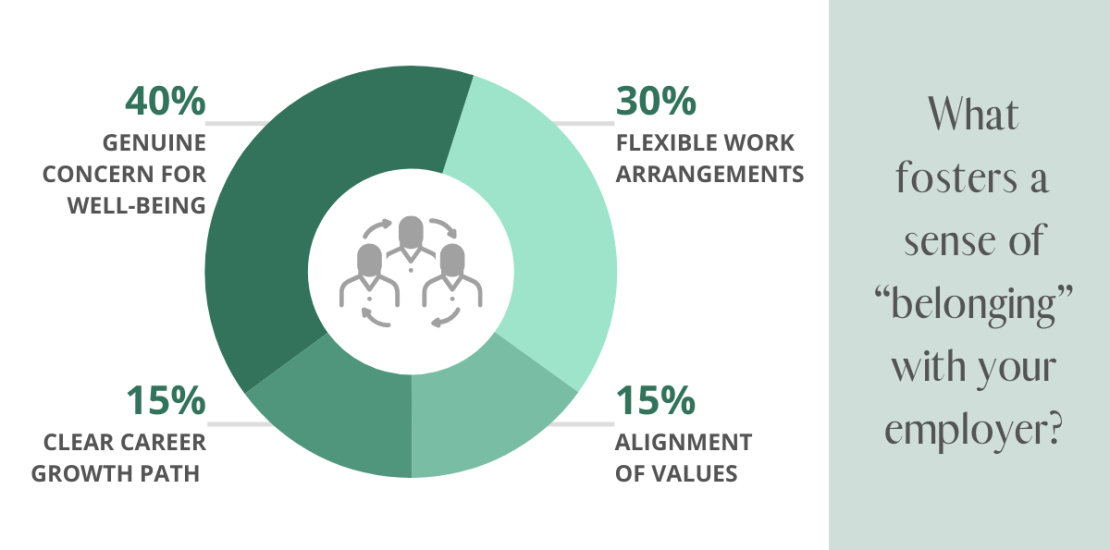Insights for Employers: Cultivating Employee “Belonging”
- May 23, 2024
- Posted by: Selen Warner
- Category: Blog

With over a quarter of the workforce experiencing declining mental health and burnout continuing to be prevalent issues, prioritizing employee mental health is imperative for organizations. Recent findings reveal that 36% of employees identify a clear sense of belonging at work as crucial for maintaining mental well-being. In today’s challenging work environment, fostering a sense of belonging is not just about creating a positive workplace culture; it’s about supporting the mental health and overall well-being of employees. As employers strive to navigate these challenges, understanding the factors that contribute to employee belonging becomes essential in creating a supportive and inclusive work environment. We wanted to understand what fosters a sense of “belonging” within an organization and polled our community for their insights.
What fosters a sense of “belonging” with your employer?
- Genuine concern for well-being 40%
- Flexible work arrangements 30%
- Alignment of values 15%
- Clear career growth path 15%
The majority, 40%, chose genuine concern for well-being as the top factor that fosters a sense of belonging. This speaks volumes about the impact of empathetic leadership and supportive workplace cultures on employee morale and satisfaction. A genuine concern for well-being not only fosters a sense of care and compassion within the workplace but also builds trust and loyalty among employees. Organizations can show their support by implementing policies and initiatives that prioritize mental and physical health. Depending on the company’s size, it is beneficial to offer resources such as counseling services or wellness programs to support employees’ holistic well-being. However, genuine concern means more than implementing those policies and programs. One-on-one conversations and regular check-ins with employees to truly listen to them can have a bigger impact. By fostering a culture of care and support, employers can create a workplace where employees feel valued, respected, and empowered to perform at their best.
For 30%, flexible work arrangements emerged as a critical factor in fostering a sense of belonging within the workplace. Offering flexibility in work schedules and location demonstrates trust and respect for employees’ autonomy and individual needs. When employees have the flexibility to manage their work in a way that suits their lifestyle, they feel empowered and valued by their employer. Flexible work arrangements also promote work-life balance, allowing employees to fulfill personal obligations and goals while still meeting professional responsibilities. However, it is a good practice to implement policies that provide clear guidelines and expectations to ensure productivity and accountability. By embracing flexibility, employers can enhance employee satisfaction and retention while promoting a healthy work-life balance.
Both alignment of values and providing clear career growth paths were chosen by 15% of respondents as top factors that foster a sense of belonging. The alignment between employees’ personal values and the organization promotes a cohesive culture where employees feel a strong connection to their workplace and encourages commitment and dedication to achieving shared goals, ultimately contributing to the organization’s success. Employers can foster this alignment by clearly communicating company values and integrating them into daily operations as well as encouraging open communication and transparency to ensure that employees understand the values and can share feedback. Additionally, providing opportunities for employees to contribute to the development and refinement of organizational values can promote ownership and investment in the company’s mission. Similarly, clear career pathways not only motivate employees to perform at their best but also foster a long-term commitment to the organization. By investing in employees’ growth and development, employers demonstrate their commitment to their success and future within the organization. This sense of investment and support promotes loyalty and retention, reducing turnover costs and ensuring a skilled and motivated workforce.
In conclusion, understanding the factors that contribute to employee belonging is crucial for employers seeking to create a positive and inclusive workplace culture. By aligning values, demonstrating genuine concern for well-being, offering flexible work arrangements, and providing clear career growth paths, employers can cultivate an environment where employees feel valued, supported, and empowered to succeed.

